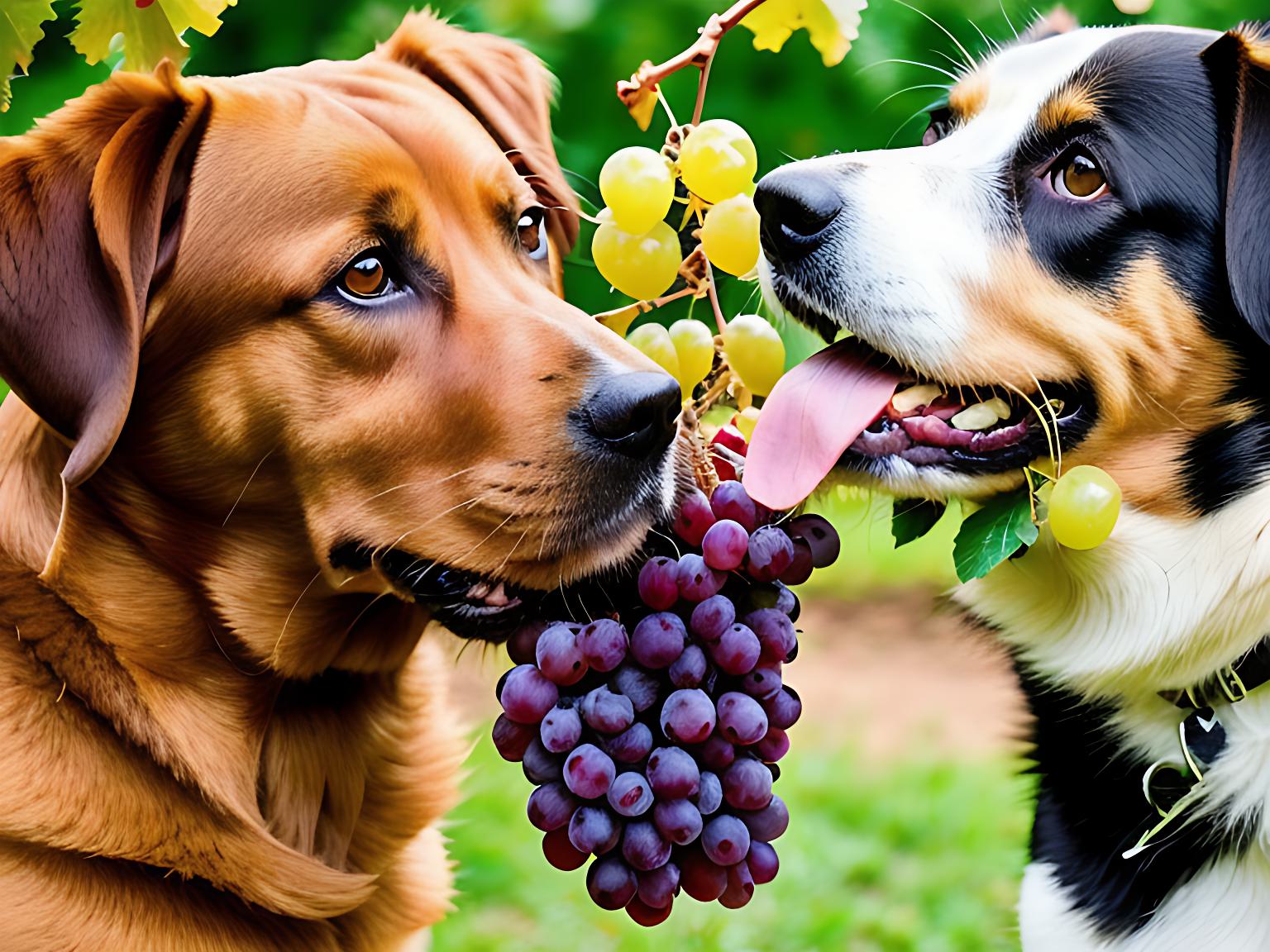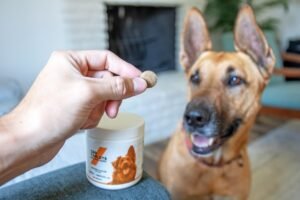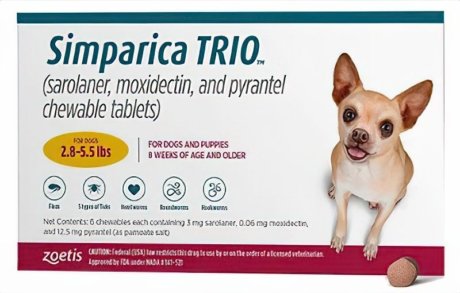Are Grapes Bad For Dogs | 8 Risks, Treatment, Benefits
As a dog owner, you want to feed your pet nutritious and well-balanced food. Some nutritious human meals, on the other hand, can be poisonous to dogs. Grapes are one of these foods. We’ll talk about whether grapes are dangerous for dogs, the signs of grape poisoning, and what to do if your dog eats grapes.
Are Grapes Bad for Dogs? Here’s What You Need to Know
It’s normal for a pet owner to want to share their favourite delicacies with their animal companion. However, not all human meals are suitable for canine consumption. Grapes are one such food that may be quite hazardous to our canine companions. In this piece, we’ll look at the risks of grape ingestion in dogs, as well as the signs of grape poisoning and what to do if your dog eats grapes.
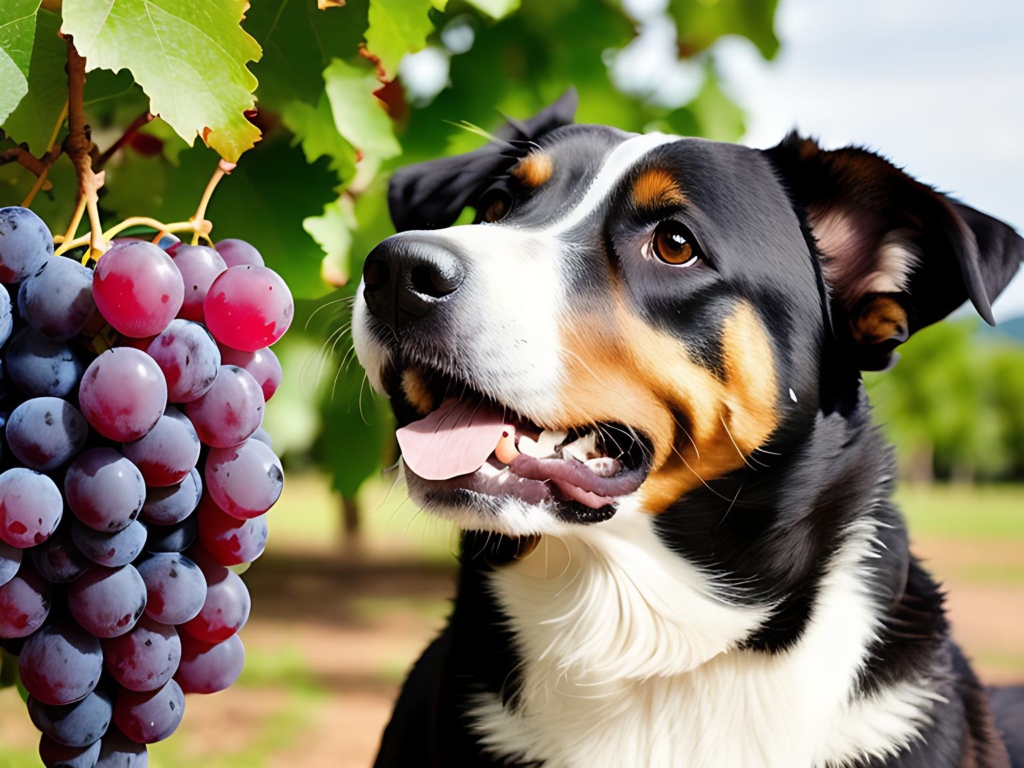
Are Green Grapes Bad For Dogs
Yes, green grapes are poisonous to dogs and can be dangerous if consumed. Grapes, whether green or red, have been associated with kidney damage in dogs. The exact toxic component of grapes has yet to be found, and it can differ from dog to dog. Some dogs might consume grapes with no apparent negative consequences, while others may exhibit severe symptoms after consuming even a small amount. It is advised to err on the side of caution and avoid giving grapes to dogs completely. If you believe your dog has eaten grapes and is exhibiting symptoms such as vomiting, diarrhoea, lethargy, or decreased appetite, seek a veterinarian’s help right once.
The Dangers of Grapes for Dogs
Grapes and raisins, their dried substitutes, may cause kidney damage in dogs. Grapes’ poisonous component has yet to be determined, and the quantity that can cause poisoning varies widely between individual dogs. It is better to avoid giving grapes and raisins to dogs completely.
It is essential to remember that not all dogs will react to grapes in the same manner. Individuals may be able to consume little amounts without being hazardous, but others may have a severe reaction even just a single grape. Furthermore, the size and weight of your dog might influence how they digest the poisonous chemical in grapes.
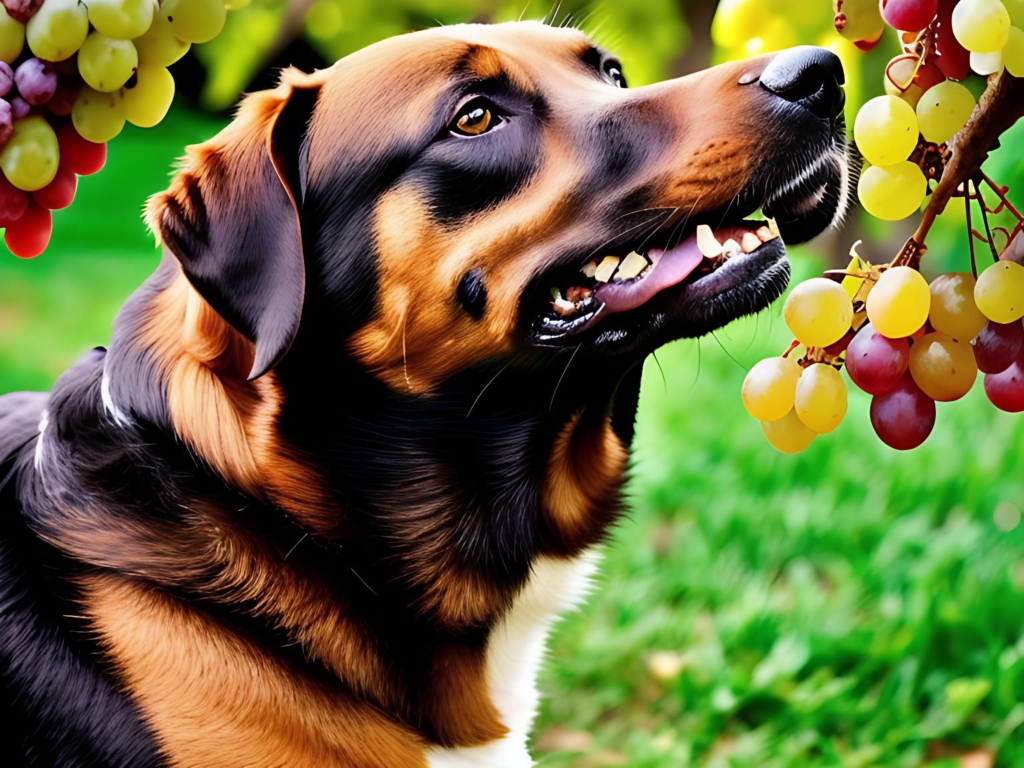
Symptoms of Grape Toxicity in Dogs
If your dog consumes grapes or raisins, you may notice the following symptoms within a few hours:
- Vomiting and diarrhea
- Lethargy and weakness
- Loss of appetite
- Abdominal pain and discomfort
- Increased thirst and urination
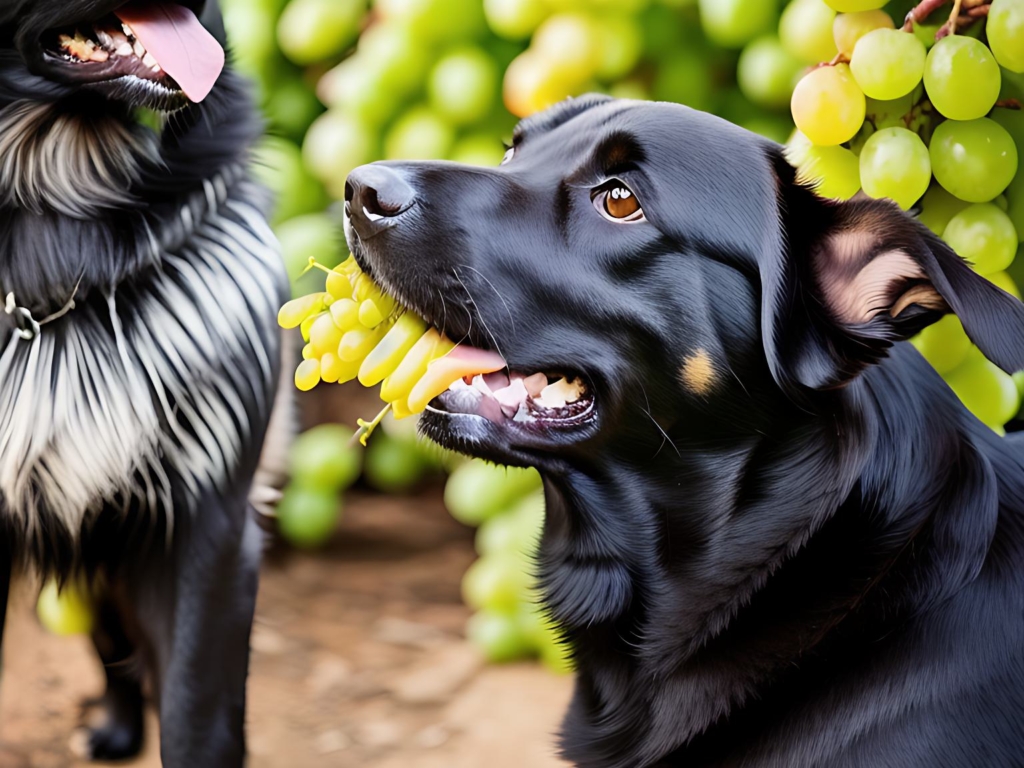
If left disregarded, these symptoms might develop to more severe illnesses such as kidney failure. If your dog develops any of these symptoms after ingesting grapes, seek veterinarian assistance immediately.
What to Do if Your Dog Consumes Grapes
If you suspect that your dog has consumed grapes or raisins, it is important to act quickly. The following steps can help mitigate the effects of grape toxicity:
- Call your veterinarian or a pet poison control hotline for advice.
- If your dog is experiencing symptoms of grape toxicity, take them to the veterinarian immediately.
- If the grape consumption was recent, induce vomiting if advised to do so by your veterinarian or poison control center.
- Follow your veterinarian’s treatment plan, which may include hospitalization, IV fluids, and monitoring for kidney function.
Preventing future incidents of grape consumption is key to avoiding grape toxicity in dogs. Ensure that all grapes and raisins are kept out of reach of your dog, and be aware of any foods that may contain grapes, such as baked goods or trail mix.
Other Foods to Avoid Giving Your Dog
Grapes are not the only human food that can be harmful to dogs. It is important to be aware of the following foods and substances that should be avoided in your dog’s diet:
- Chocolate
- Onions and garlic
- Avocado
- Xylitol (an artificial sweetener found in sugar-free gum and other products)
- Alcohol
- Caffeine
In general, it is best to stick to balanced, nutritionally-complete dog food to ensure that your dog is receiving all of the necessary nutrients for their health and well-being.
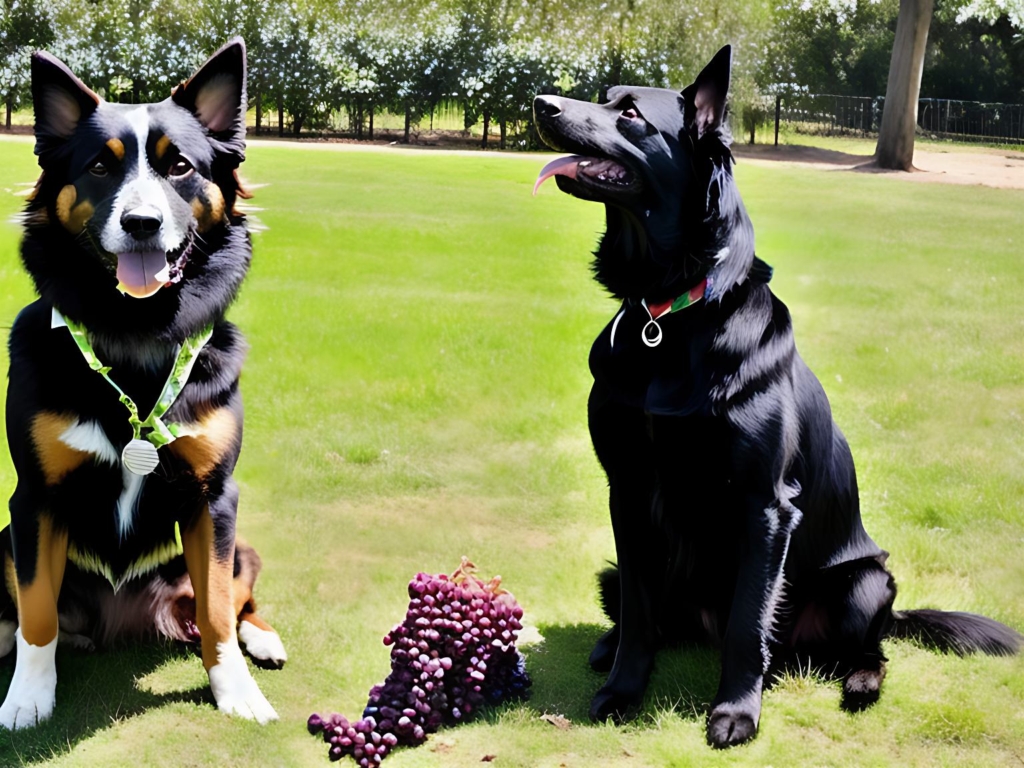
Conclusion on Are Grapes Bad For Dogs:
Grapes are particularly harmful to dogs, so avoid feeding them to your furry friend. If your dog consumes grapes, get veterinarian assistance right once to reduce the symptoms of grape poisoning. Additionally, be aware of any foods and chemicals that might be dangerous to your dog and take precautions to keep them away from these items. You can help your dog live a long and happy life by monitoring their food and providing them with a balanced, nutritious diet.
- Can Dogs Have Cinnamon | 5 Benefits, Side Effect, Safety
- Can Dogs Eat Avocado | 10 Benefits, Health Issues, Risks
- Can Dogs Eat Potatoes | Nutrition, 8 Benefits, Risk, Health
Frequently Asked Questions on Are Grapes Bad For Dogs:
-
Are grapes toxic to dogs?
Yes, grapes and raisins can cause kidney failure in dogs and should be avoided.
-
What should I do if my dog eats grapes?
If your dog eats grapes, it is important to seek veterinary care immediately. Call your veterinarian or a pet poison control hotline for advice.
-
What are the symptoms of grape toxicity in dogs?
Symptoms of grape toxicity in dogs may include vomiting and diarrhea, lethargy, loss of appetite, abdominal pain, and increased thirst and urination.
-
Can all dogs tolerate grapes?
No, not all dogs will react the same way to grapes. Some may be able to consume small amounts without showing any signs of toxicity, while others may have a severe reaction to even a single grape.
-
Why are grapes toxic to dogs?
The toxic substance in grapes has not yet been identified, and the amount that can cause toxicity can vary greatly between individual dogs.
-
Can dried grapes (raisins) be given to dogs?
No, raisins are just as toxic to dogs as grapes and should be avoided.
-
What other human foods should I avoid giving to my dog?
Other human foods that can be harmful to dogs include chocolate, onions and garlic, avocado, xylitol, alcohol, and caffeine. It is important to stick to balanced, nutritionally-complete dog food to ensure that your dog is receiving all of the necessary nutrients for their health and wellbeing.
-
Can dogs get sick from eating table scraps?
Yes, dogs can become sick from eating table leftovers, especially if the dish is heavy in fat, salt, or spices. It is recommended to stick to a nutritionally complete dog food to ensure that your dog is getting all of the vital nutrients for their health and welfare.
-
What should I do if my dog eats something they shouldn’t?
If your dog eats something they shouldn’t, it is important to seek veterinary care immediately. Call your veterinarian or a pet poison control hotline for advice.
-
How often should I take my dog to the veterinarian?
It is recommended to take your dog to the veterinarian for an annual check-up and vaccinations. However, if you notice any changes in your dog’s behavior or health, it is important to seek veterinary care right away.
-
What are some common health problems in dogs?
Some common health problems in dogs include obesity, dental disease, arthritis, allergies, and cancer.
-
How can I keep my dog healthy?
Maintaining your dog’s health requires frequent exercise, a balanced and nutritious food, and routine veterinarian treatment. In addition, ensure that your dog is up to date on immunisations and is protected against parasites such as fleas and ticks.
-
Can dogs get sunburned?
Sunburn may occur in dogs, particularly in places with less hair and pigmentation, such as the nose and ears. It is important to offer shade and limit extended sun exposure, particularly during the warmest times of the day. To protect your dog’s skin, apply dog-safe sunscreen.
-
What is the best way to keep my dog’s teeth clean?
Dental care is essential for your dog’s general health. Brushing your dog’s teeth on a regular basis, offering dental chews or toys, and arranging frequent dental cleanings with your veterinarian are all ways to keep your dog’s teeth clean.
Recommended related to Are Grapes Bad For Dogs:
Can Dogs Eat Rice | 8 Benefits, Risks, Can Feed Daily?

























